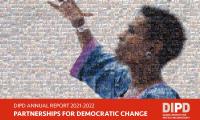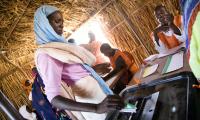Engagement med de mest marginaliserede i Nepal
In the third week of March, the multiparty platform JOMPOPS – DIPD’s partner in Nepal – provided a leadership skills’ training programme for around 70 local Dalit women from various political parties.
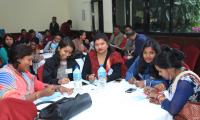
In the third week of March, the multiparty platform JOMPOPS (Joint Mechanism for Political Party Strengthening) – DIPD’s partner in Nepal – provided a leadership skills’ training programme for around 70 local Dalit women from various political parties. The JOMPOPS platform also supported their participation in the discussion about the new strategy for advancing the Dalit issues, which took place on the eve of the International Day for the Elimination of Racial Discrimination on 20 March 2018.
Understanding the issues of Dalits
Many argue that discrimination against Dalits and racial discrimination may not be the same thing, but it is comparable because both are forms of discrimination that target people because of their descent. Yet, the issues of Dalits have never received the same kind of attention from the global community as racial discrimination. As a result, the Dalit issue continues to be neglected at the national level and many Dalits still face severe discrimination, despite several international and national initiatives banning caste discrimination.
The Dalit issue is linked to the hierarchical Hindu caste system, which persists in large parts of South Asia. This caste system categorizes Brahmins (priests) at the top of the caste hierarchy, followed by Kshatriyas (soldiers), Vaishyas (traders) and Shudras (servants). Dalits are considered to be at the bottom of the caste hierarchy, and, as such, are treated as Untouchables.
Traditionally, Dalits were not only forced to live in segregated settlements but were also prevented from using public roads, drinking from common wells, and entering Hindu temples, schools and hospitals frequented by the privileged castes. As a result, their access to education and health was extremely limited and their basic right to dignity violated. Dalits became the most marginalized communities in Nepal, in terms of socio-economic indicators and political representation. And the Dalit women, because they are women, are worse off.
The new Constitution of Nepal 2015 tried to address this problem by introducing affirmative action in favour of Dalits, including allocation of seats for women in locally elected bodies. However, these positive changes have not yet proved sufficient to wipe out discrimination against Dalits. Reports about Dalit women being beaten, maimed or even killed, after accusations of witchcraft, remain common. And, two years ago, a Dalit man was beaten to death simply for entering the kitchen of a so-called upper caste family. Even after the promulgation of new Constitution, there have been incidents which highlight persistent Dalit discrimination, including the case, a year ago, of a young couple who committed suicide because the girl’s parents – of an upper caste family – wouldn’t allow to her marry her Dalit boyfriend.
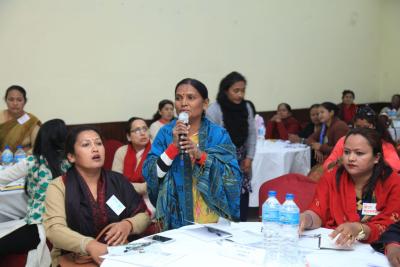
Training Programme
On 18 March 2018, 70 women from the Dalit community representing various political parties from across Nepal’s seven provinces, participated in training in topics including leadership, communication skills, media relations, multiparty collaboration/team building and time management. The women who participated were mostly elected local representatives or they held leadership positions inside their respective parties at the local/provincial level, along with participation of some of the few that had made it to the parliament.
This training was organized by the Inter-Party Dalit Women’s Network, in partnership with the JOMPOPS platform. According to the organizers, Dalit women newly appointed to leadership positions, thanks to the new Constitution’s targeted affirmative action strategy, lack the skills necessary to perform their jobs. This is because women from the Dalit community have been offered few opportunities in the past to develop their skills.
In addition to the formal training programme, participants also had the opportunity to share their personal stories and inspire each other. One Dalit woman from the Nepali Congress Party told participants she had not been elected Deputy Mayor, during recent local elections, despite her competence because of a discriminatory caste-based campaign against her. She said the upper caste people who ran the hate campaign told voters they would not go to heaven if they elected a daughter of the Untouchable Dalit caste.
More importantly, the programme provided an avenue to build network of Dalit women at the provincial level. It is expected that when they return to their Provinces, they will share their new skills with other Dalit women in their parties, as they try to strengthen their advocacy through the district-level branches of the Inter-Party Dalit Women’s Network.
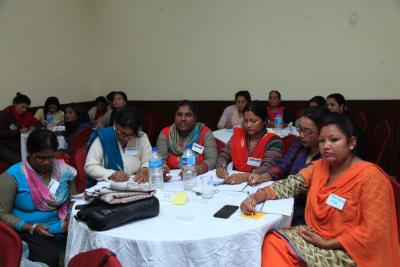
Relevance of the Training
While a one-off training event cannot transform the capacity of Dalit women, as the first ever programme of its kind, it was greatly appreciated by participants. According to one of the Dalit leaders, Dhana Kumari Sunar:
The training provided local Dalit women from the seven provinces with an exceptional opportunity to gain necessary leadership skills. There is very little training for locally elected representatives, and Dalits cannot access even the limited training which is available because it targets higher level representatives, such as mayors and deputy mayors – of which there are only a handful Dalits.
Dalit women appreciated the session on media relations very much because they really need that skill to help get their issues out to the public.
The opportunity to share and network during the programme has led to the formation of the multiparty Network of Dalit Women in the five provinces, immediately after the programme; we hope to extend it to all the seven provinces in the future. We feel that as others do not speak on our issues we must do it for ourselves.
Overall, the programme was very encouraging for the local female Dalit leaders and we are thankful to DIPD for supporting this initiative.
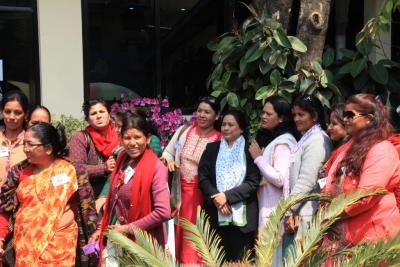
More information
Read more about DIPD's engagements in Nepal
Contact DIPD’s Country Representative for Nepal, Shristi Rana: shristi@dipd.org.np
This page is also available on the english site. Click on english in top menu.
